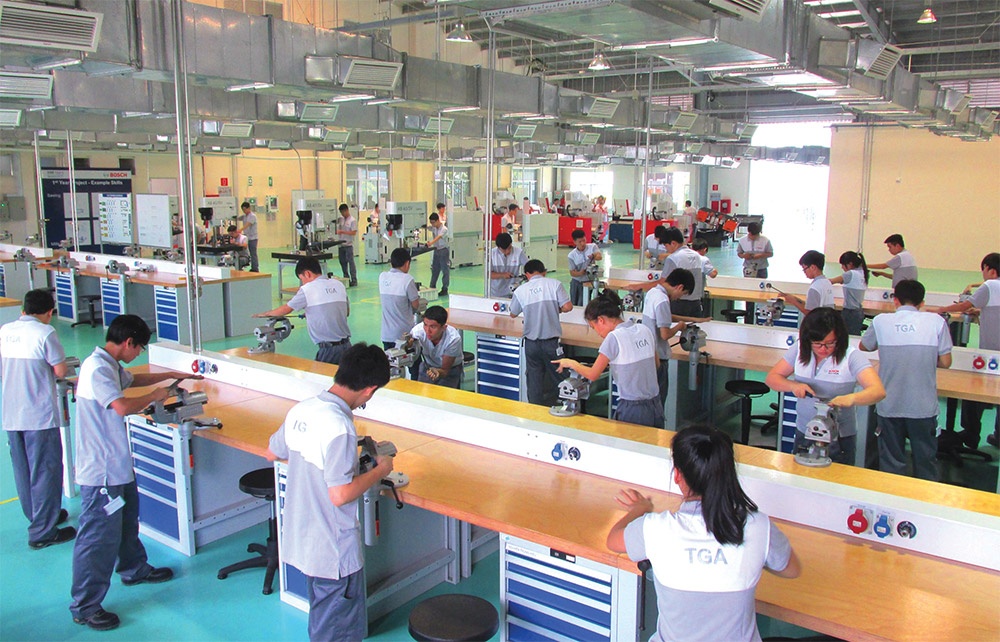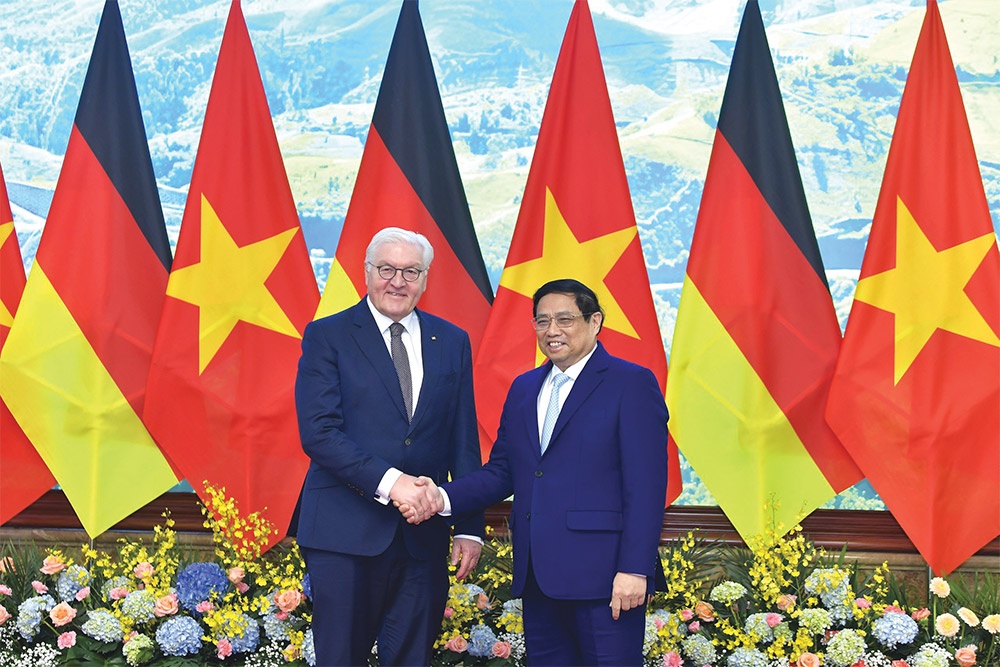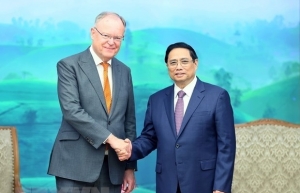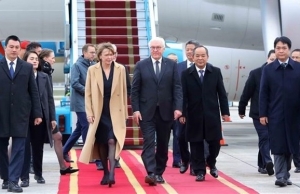Investment intensified through German activities
 |
| German groups have been instrumental in medical equipment, chemicals, and more, photo Le Toan |
During German President Frank-Walter Steinmeier’s state visit to Vietnam last week, both nations agreed that the EU-Vietnam Free Trade Agreement (EVFTA) has and will continue to be a crucial driver of the two countries’ economic, trade, and investment ties.
Vietnam and Germany also pledged to facilitate investment flows thanks to the EVFTA’s reduced tariffs. Thanks to the EVFTA, bilateral trade last year hit approximately $12 billion, tripling over the past 10 years.
Vietnam also asked Germany to soon ratify the EU-Vietnam Investment Protection Agreement in service of investors from both sides.
“The Vietnamese government pledges to always accompany and create all the best conditions for German enterprises to fruitfully do business and investment in Vietnam based on harmonised benefits, and sharing of risks,” stressed Prime Minister Pham Minh Chinh.
 |
| During German President Frank-Walter Steinmeier’s state visit to Vietnam last week, both nations agreed that the EU-Vietnam Free Trade Agreement has and will continue to be a crucial driver of the two countries’ economic, trade, and investment ties. It comes at a time when Vietnam and the European Parliament are ramping up progress on getting the accompanying EU-Vietnam Investment Protection Agreement ratified as soon as possible. In the meantime, hundreds of German companies will continue to pour money into their operations in Vietnam, in areas from manufacturing and medical equipment to chemicals, vehicles, and high-tech products., photo VNA |
According to statistics from Vietnam’s Ministry of Planning and Investment, currently, about 500 German companies are effectively operating in Vietnam, of which around 80 per cent have manufacturing plants in the country, creating as many as 47,000 jobs. Cumulatively as of December 20, German firms had 463 valid projects in Vietnam, registered at $2.68 billion.
The first German investments flowed into Vietnam shortly after the country opened its doors to foreigners. In 1992, Bültel, producing fashion for brands such as Camel Active, settled down in the southern province of Binh Duong. In the same year Tatonka, an outdoor brand, opened a backpack production line in Ho Chi Minh City. German investments began really gaining steam when Vietnam ascended to the World Trade Organization in 2007 and received another impetus with the 2015 amendments to the laws on enterprises and investment.
Currently, more than half of the German companies are concentrated in the south of Vietnam, with Ho Chi Minh City being the commercial centre. Some of the oldest and biggest German investments lie in the cities of Hanoi and Haiphong in the north, while central Vietnam is attractive because of its lower land and labour costs as well as good living conditions.
Recently, the main driver for German investments in Vietnam is the emerging diversification strategy followed by many companies in order to broaden their representation in different parts of the world and to reduce individual country risks.
The largest German investments have been implemented by Bosch (automotives), Stada – Pymepharco (medical equipment) and Messer Gases (chemicals). Bosch is employing a major manufacturing complex for push belts in the southern province Dong Nai while also operating a research and development centre in Ho Chi Minh City, while Stada – Pymepharco manufactures pharmaceuticals in its factory in the south-central Phu Yen province. And Messer is supplying gases to local customers such as Hoa Phat from its main production hubs in the northern province of Hai Duong and the south-central province of Quang Ngai.
German project developer PNE AG plans offshore wind farms off the coast of the south-central province of Binh Dinh with a capacity of up to 2GW and an investment volume of several billions of US dollars.
Most of the energy generated by offshore wind farms planned by PNE AG will be consumed in the region and thus does not burden the national power grid, which would enable the ideal symbiosis between economic growth and sustainable development.
Last September, German Leonhard Kurz Group also inaugurated a 12-hectare factory producing high-tech thin films with an investment of $40 million for the first phase in Binh Dinh. The factory has a total capacity of 15 million square metres of products a year, with environmental friendly materials used.
In 2022, the Binh Dinh government and Leonhard Kurz Group signed an MoU on implementing this project, with total capital for the two phases amounting to $100 million.
Several German companies have also successfully utilised merger and acquisition strategies to establish themselves in Vietnam.
For example, Ottobock, a German manufacturer of orthopaedic and prosthetic devices, has expanded its presence in Vietnam by acquiring a local competitor. The acquisition allowed Ottobock to establish branches in Ho Chi Minh City and Hanoi, reaching a larger customer base, according to the Delegation of German Industry and Commerce (AHK Vietnam).
In another case, in the food industry, Gourmet Dairy Zott acquired Delys, a long-standing Vietnamese importer and distributor. As part of their commitment to consistently implement their planned development strategies, Zott Vietnam Co., Ltd. was founded, with its headquarters situated in Hanoi and a branch in Ho Chi Minh City.
“This strategic step effectively solidified Zott’s leadership position within the local dessert sector,” said Marko Walde, chief representative of AHK in Vietnam, Myanmar, Cambodia and Laos.
What is more, FUCHS, one of the world’s largest lubricant manufacturers, has acquired 70 per cent of the lubricants business of STD & S Co., Ltd., a distributor of speciality lubricants based in Vietnam.
“This expansion included the opening of a new high-tech plant in the southern province of Ba Ria-Vung Tau, responding to the growing demand for lubricants in the region,” Walde said.
Meanwhile, HDI Global SE, a subsidiary of Germany’s Talanx Group, invested in PVI JSC, a prominent Vietnamese insurance company. The investment aimed to access the rapidly growing Vietnamese insurance market and enhance PVI’s growth. In October 2023, HDI submitted an application to acquire an additional one million shares of PVI with the intention of bolstering their investment and increasing their ownership stake. Before this transaction, HDI already held more than 90 million PVI shares, granting them a substantial 38.47 per cent ownership in the company.
 | Leader of German state optimistic about cooperation with Vietnam Following a five-day visit to Vietnam earlier this month, Minister-President of the German state of Lower Saxony (Niedersachsen) Stephan Weil said the trip has opened up major opportunities for cooperation between the German state and Vietnamese localities. |
 | German presidential visit underpinning robust links The economic links between Germany and Vietnam continue to be intensified thanks to the free trade deal with the EU, and with the former willing to assist the latter in green development in particular. |
What the stars mean:
★ Poor ★ ★ Promising ★★★ Good ★★★★ Very good ★★★★★ Exceptional
Related Contents
Latest News
More News
- Kurz Vietnam expands Gia Lai factory (February 27, 2026 | 16:37)
- SK Innovation-led consortium wins $2.3 billion LNG project in Nghe An (February 25, 2026 | 07:56)
- THACO opens $70 million manufacturing complex in Danang (February 25, 2026 | 07:54)
- Phu Quoc International Airport expansion approved to meet rising demand (February 24, 2026 | 10:00)
- Bac Giang International Logistics Centre faces land clearance barrier (February 24, 2026 | 08:00)
- Bright prospects abound in European investment (February 19, 2026 | 20:27)
- Internal strengths attest to commitment to progress (February 19, 2026 | 20:13)
- Vietnam, New Zealand seek level-up in ties (February 19, 2026 | 18:06)
- Untapped potential in relations with Indonesia (February 19, 2026 | 17:56)
- German strengths match Vietnamese aspirations (February 19, 2026 | 17:40)

 Tag:
Tag:




















 Mobile Version
Mobile Version